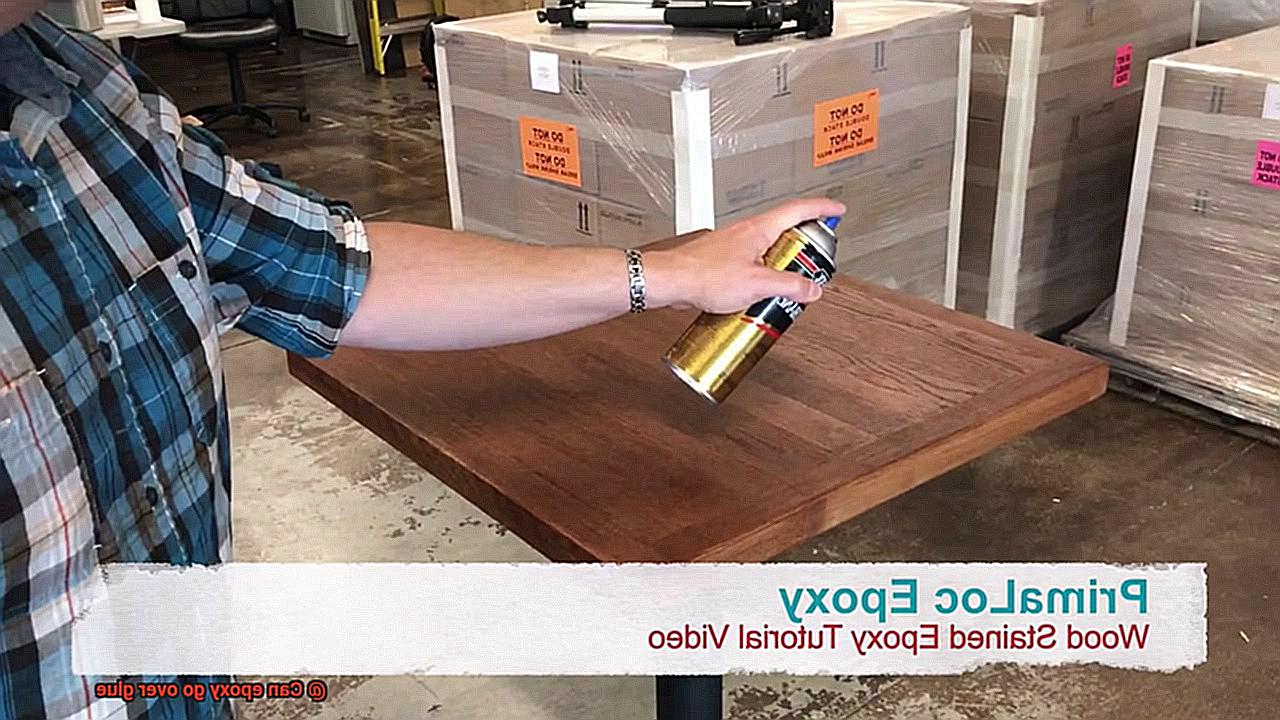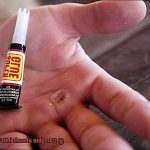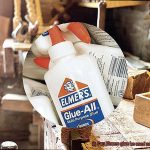As a DIY enthusiast or artisan, you know that adhesives are essential to your craft. But have you ever found yourself wondering, “Can epoxy go over glue?” It’s a common question, and the answer is yes – but it’s not always straightforward.
Epoxy and glue are both popular bonding agents used for various applications. From improving the structure of wooden furniture to creating stunning jewelry pieces, these adhesives play an important role in many projects. However, when working on projects that require both bonding agents, it can be challenging to know if epoxy can go over glue.
The truth is, using epoxy over certain types of glue may lead to negative results such as incomplete curing, unpredictable bonding, or even surface damage. So before applying epoxy over any type of glue, it’s crucial to understand the type of adhesive used and the condition of the surface.
To ensure a successful bond between epoxy and glue, proper surface preparation is also critical. This may involve thorough cleaning and sanding to remove any residue or debris from the surface.
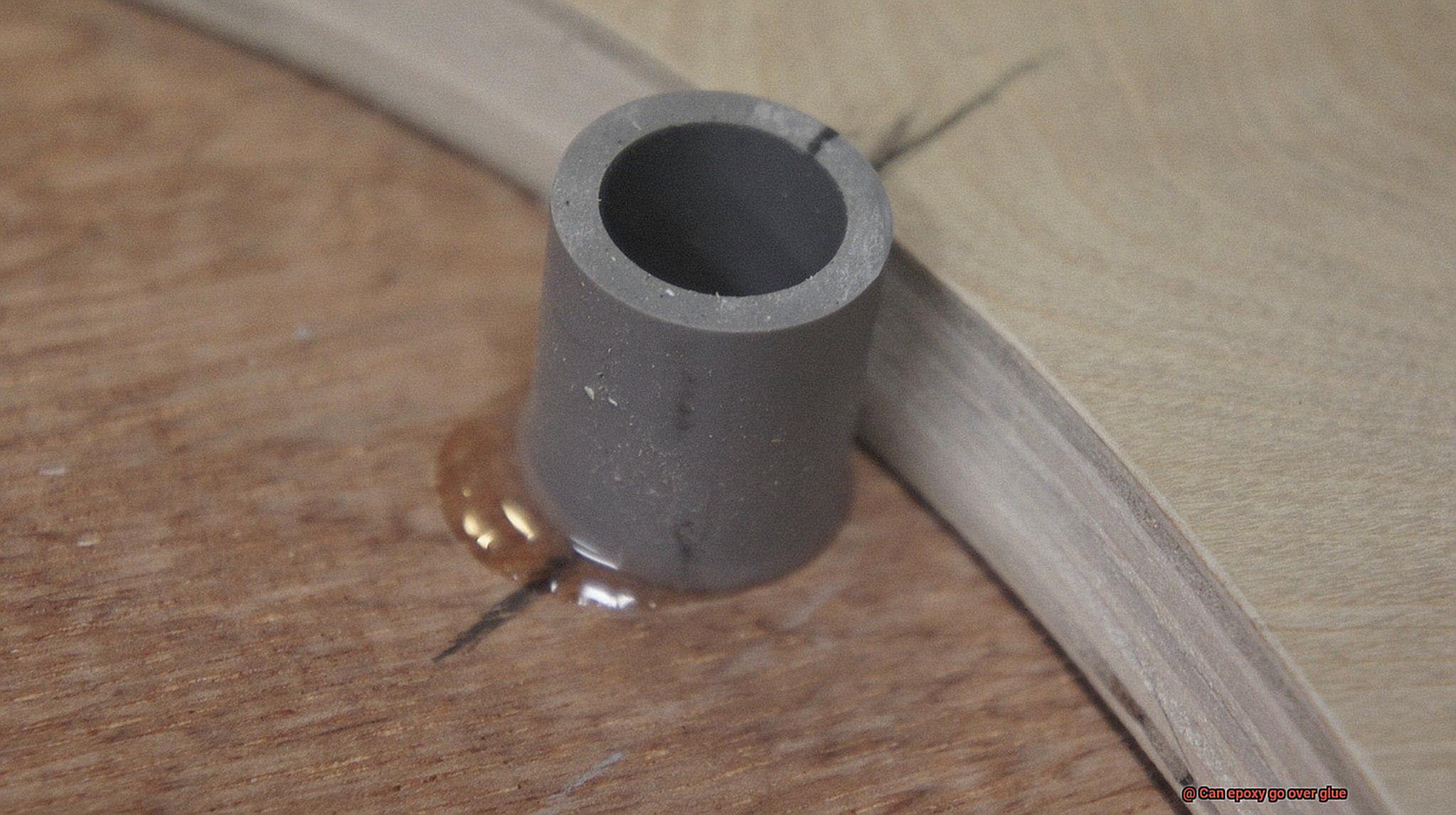
In this blog post, we’ll dive deeper into this topic by exploring the different types of adhesives that epoxy can go over. We’ll also discuss necessary preparation steps to ensure a successful bonding process and provide some general tips and tricks to keep in mind. So let’s get started.
What is Glue?
Contents
- 1 What is Glue?
- 2 What is Epoxy?
- 3 Different Types of Glue
- 3.1 PVA Glue
- 3.2 Epoxy Glue
- 3.3 Super Glue
- 3.4 Contact Cement
- 3.5 Hot Glue
- 3.6 When it comes to choosing the right glue for your project, consider the materials you will be bonding and the circumstances in which they will be used. It’s also important to follow proper preparation and application techniques for optimal results.
- 3.7 Can Epoxy Go Over Glue?
- 4 Can Epoxy Go Over Glue?
- 5 Advantages of Applying Epoxy Over Glue
- 6 Disadvantages of Applying Epoxy Over Glue
- 7 Preparation Before Applying Epoxy Over Glue
- 8 Following Manufacturer’s Instructions for Both the Glue and Epoxy Products
- 9 Conclusion
Glue is a captivating and essential component in the world of DIY projects and repairs. It is an adhesive that can be made from various materials: natural substances like animal hides, or synthetic compounds like polyvinyl acetate (PVA) and cyanoacrylate. Glue comes in many forms, including liquids, gels, pastes, and tapes, each with its distinct properties and uses.
The primary function of glue is to create a strong bond between two surfaces that will hold up over time. This is achieved by creating a chemical reaction between the adhesive and the surface it is applied to. When the two surfaces come into contact, the molecules in the adhesive cross-link with the molecules in the surface, forging a robust bond that is difficult to break.
There are numerous types of glue available, each designed for specific purposes and materials. Wood glue is ideal for bonding wood surfaces together, while superglue is perfect for small repairs and projects that require a quick-drying adhesive. Epoxy is a popular choice for bonding materials together permanently, while hot glue can be used for a range of applications from crafting to home repairs.
When it comes to bonding materials together using both glue and epoxy, it’s crucial to choose the right type of glue for your project. Cyanoacrylate (super glue) and polyurethane glue can be used in conjunction with epoxy as they create a strong enough bond to withstand the pressure and weight of the epoxy. On the other hand, PVA glue may not be suitable as it does not provide a strong enough bond.
In addition to selecting the appropriate type of glue for your project, it’s essential to follow proper preparation and application techniques to ensure a resilient and long-lasting bond. This includes cleaning the surface, sanding it lightly to create a rough texture for the epoxy to adhere to, and then wiping away any debris or dust.
What is Epoxy?
Epoxy is a two-part adhesive consisting of a resin and a hardener. When these two components are mixed together, they create a chemical reaction that causes the mixture to cure and harden into a sturdy, waterproof bond.
Epoxy has become a popular choice for various applications, including construction, woodworking, and automotive repair. It’s versatile, able to bond an array of materials such as metal, wood, concrete, and plastic. Additionally, epoxy can act as a coating or sealant to protect surfaces from moisture and corrosion.
One of the reasons why epoxy is so popular is its customization options. You can choose from fast-drying or slow-curing formulations, allowing you to cater to your project’s specific needs. Furthermore, epoxy can be tinted or colored to match your project’s aesthetic, making it an ideal choice for DIY enthusiasts.
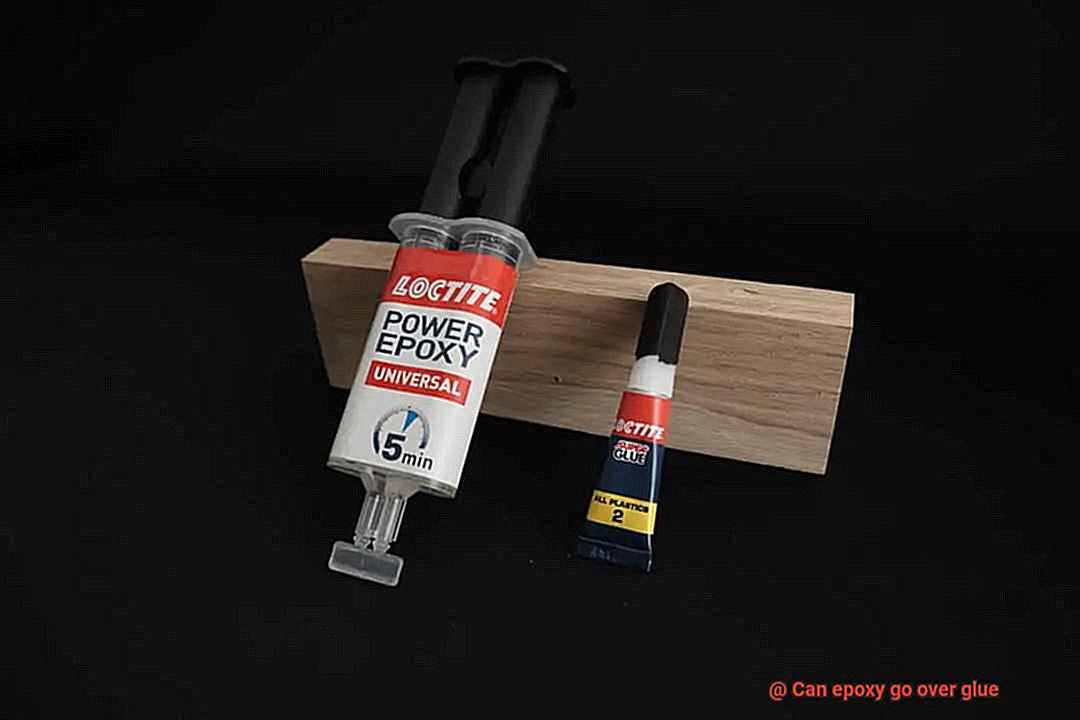
If you’re diving into DIY projects that require a strong bond or protective coating, consider giving epoxy a try. It’s an adhesive that offers excellent bonding strength and durability. Not only will it provide lasting results, but it will also give your project the professional finish it deserves.
Different Types of Glue
When it comes to bonding materials together, choosing the right type of glue for your project is crucial. With so many options available, it’s important to understand the advantages and disadvantages of each type. Here are some of the most common types of glue available on the market:
PVA Glue
Also known as white glue, PVA glue is a water-based adhesive commonly used in woodworking and paper-based projects. It dries clear and is easy to clean up with water. PVA glue is ideal for porous materials like paper, cloth, and wood. However, it may not be strong enough for heavy-duty projects and can take a while to dry.
Epoxy Glue
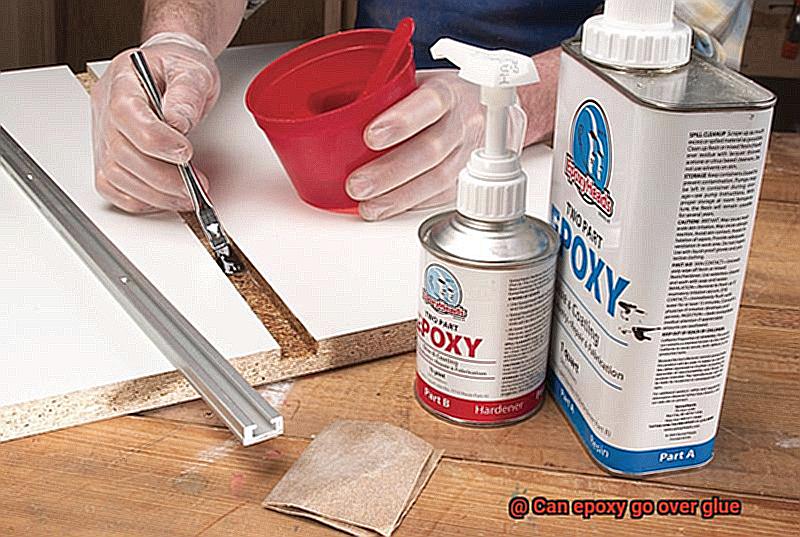
Epoxy is a two-part adhesive made up of a resin and hardener. It is ideal for bonding materials like metal, ceramics, and plastics. Epoxy glue forms a strong bond that can withstand high stress and impact. However, it can be messy to work with and requires mixing before use.
Super Glue
Also known as cyanoacrylate glue, super glue is a fast-drying adhesive used for bonding small items like ceramics, plastic, and wood. It forms a strong bond quickly but may not be suitable for larger projects or items that will be exposed to high stress.
Contact Cement
Contact cement is a strong adhesive that requires both surfaces to be coated with the glue before they are joined together. It is ideal for bonding large surfaces like laminates, veneers, and countertops. However, it can be difficult to work with and requires proper ventilation when in use.
Hot Glue
Hot glue is a thermoplastic adhesive that is applied using a hot glue gun. It is ideal for bonding materials like fabric, cardboard, and foam. Hot glue dries quickly but may not be suitable for heavy-duty projects and can be messy to work with.
When it comes to choosing the right glue for your project, consider the materials you will be bonding and the circumstances in which they will be used. It’s also important to follow proper preparation and application techniques for optimal results.
Can Epoxy Go Over Glue?
The answer to this question largely depends on the type of glue used. Epoxy can be applied over certain types of glue, such as cyanoacrylate and polyurethane glue. However, it may not be suitable for use with PVA glue as it does not provide a strong enough bond. It’s always important to read the manufacturer’s instructions before using epoxy over any type of glue.
Can Epoxy Go Over Glue?
The question of whether epoxy can go over glue isn’t as simple as a yes or no answer. Let’s explore what factors determine if it’s possible.
Firstly, not all glues are created equal. PVA glue, commonly used in woodworking and crafts, may not provide a strong enough bond for epoxy to adhere to. Additionally, PVA glue can dissolve when exposed to moisture, making it unsuitable for use with epoxy coatings. However, cyanoacrylate (super glue) and two-part epoxy adhesives are known for their strong bonds and can work well with epoxy coatings.
But wait, there’s more. Proper surface preparation is crucial when applying epoxy over any type of glue. Any residue or contaminants left on the surface could compromise the bond and lead to a failed coating. Therefore, it’s essential to thoroughly clean and prepare the surface before applying the epoxy.
Advantages of Applying Epoxy Over Glue
When it comes to adhesive options, the market is flooded with choices. But if you want an adhesive that offers superior strength and durability, versatility, resistance to harsh conditions, and longer working time, then epoxy is the way to go. As an expert on the advantages of applying epoxy over glue, I can tell you that it’s an exceptional choice for a wide range of applications.
Firstly, the bond created by epoxy is incredibly strong and durable. The two-part adhesive consists of a resin and hardener which, when mixed together, create a chemical reaction resulting in a bond that is often stronger than the materials being bonded together. This makes it ideal for heavy-duty repairs or industrial projects where strength is a top priority.
In addition to its strength, epoxy is also versatile. It can bond a wide range of materials including metal, wood, plastic, and even glass. This makes it an excellent choice for DIY projects or repairs where multiple materials need to be bonded together.
Another advantage of epoxy over glue is its resistance to harsh conditions. Epoxy can withstand exposure to water, heat, and chemicals better than most types of glue. This makes it an ideal choice for applications where the bonded materials will be exposed to these conditions.
Finally, epoxy offers a longer working time than many types of glue. This means that users have more time to position and adjust the materials before the adhesive sets. This can be particularly useful for larger or more complex projects where precise positioning is critical.
Disadvantages of Applying Epoxy Over Glue
While epoxy is a fantastic adhesive superhero that can conquer almost any bonding challenge, there are some drawbacks to using it over glue.
One major concern is that the epoxy may not bond properly with the glue, resulting in a weaker overall bond. This can cause the epoxy to peel away from the surface over time or the glue to become dislodged under the epoxy layer. This can be frustrating and time-consuming to fix.
Another issue is that the epoxy may not cure properly over the glue, leaving a tacky or sticky surface that won’t adhere well to other materials. In some cases, the epoxy may not harden at all, leaving a pliable surface that’s not suitable for most applications. This can lead to wasted time and resources on a project that doesn’t meet your expectations.
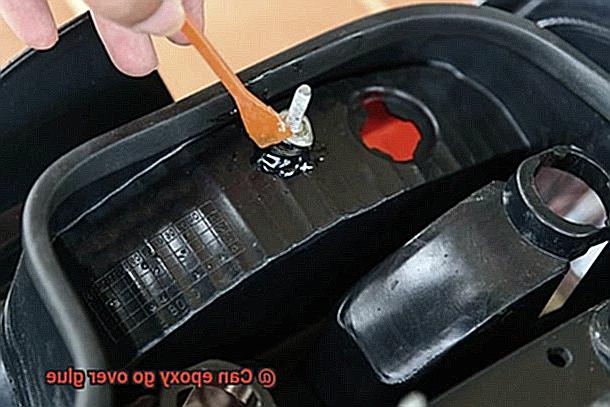
Aside from these technical issues, there are also practical considerations to keep in mind. Applying epoxy over glue can be more complex and time-consuming than using one adhesive or the other. It may require additional preparation and testing to ensure that the two substances will work together properly. This means more time spent on your project and less time enjoying the final result.
Lastly, applying epoxy over glue may not always look good. Depending on the type of glue used, there may be visible discoloration or texture differences between the two layers. This can be especially problematic if the surface will be visible or if a smooth and uniform finish is desired. This can detract from the overall aesthetic appeal of your project.
Preparation Before Applying Epoxy Over Glue
Before you get started, it’s important to take the necessary precautions to ensure a strong bond between the two materials.
The first step in the preparation process is to thoroughly clean the surface where the epoxy will be applied. To achieve this, use a mild detergent and warm water to remove any dirt, debris, or contaminants that may interfere with the adhesion of the epoxy. Once cleaned, rinse the surface with clean water and dry it with a clean cloth.
The next step is to roughen up the surface of the glue. This step is crucial as it provides a better mechanical bond for the epoxy. You can accomplish this by using sandpaper or a wire brush to create small scratches or indentations on the surface.
Before applying the epoxy, it’s important to test the compatibility of the glue and epoxy first. This involves applying a small amount of epoxy onto the glue and allowing it to cure for at least 24 hours. If the epoxy doesn’t adhere well or shows signs of peeling or cracking, consider using a different type of adhesive or surface preparation method.
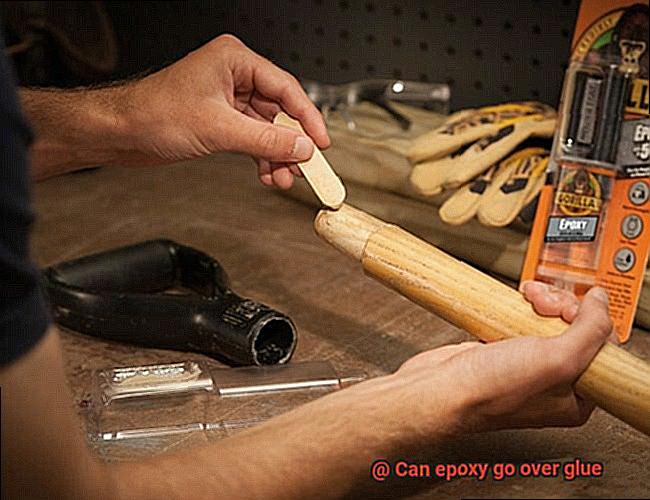
When you’re ready to apply the epoxy, make sure to follow the manufacturer’s instructions carefully. This includes mixing and applying the epoxy properly and ensuring proper ventilation during the curing process. Failure to do so could result in poor adhesion or even health hazards.
To recap, preparing the surface before applying epoxy over glue involves cleaning, roughening up the surface, testing compatibility, and following manufacturer instructions. By taking these steps and following proper preparation procedures, you can ensure a strong and durable bond between epoxy and glue for your project.
Following Manufacturer’s Instructions for Both the Glue and Epoxy Products
If you’re planning to use glue and epoxy products in your project, it’s crucial to follow the manufacturer’s instructions for both. As an expert in this field, I can tell you that this is non-negotiable. The good news is that it’s not as complicated as you may think.
Let’s start with compatibility. Not all glues and epoxies are compatible, and using the wrong combination can lead to disastrous results. Before you begin, make sure to check the compatibility of both products. By doing so, you can avoid potential issues such as weak bonds or even complete failure.
Next, let’s talk about application methods. Each product has its own set of unique requirements and limitations when it comes to applying them. This may involve using specific tools or techniques to ensure proper adhesion and curing. By following these instructions, you can ensure that your project is completed with the highest level of quality and durability.
It’s important to remember that the manufacturer’s instructions are there for a reason – to help you achieve a successful bond and ensure the longevity of the finished product. Ignoring them is simply not an option. Think of it like a recipe – if you don’t follow the instructions, your dish may not turn out the way you intended.
Conclusion
To sum it up, the answer to the question “Can epoxy go over glue?” is yes, but there are some important factors to consider. The success of the bond depends on the type of glue used and proper surface preparation. Each adhesive has its own strengths and weaknesses, so it’s crucial to select the right one for your project.
Epoxy is a versatile adhesive that provides excellent bonding strength and durability. However, using epoxy over glue can pose compatibility and curing issues. To avoid these problems, it’s essential to follow proper preparation techniques. This includes thoroughly cleaning the surface, roughening up the glue for better mechanical adhesion, testing compatibility before applying epoxy, and following manufacturer instructions for both products.
For DIY enthusiasts or artisans, understanding the differences between adhesives and their properties is crucial. By selecting the appropriate adhesive for your project and following proper preparation techniques, you can achieve a strong and long-lasting bond that will endure over time.

